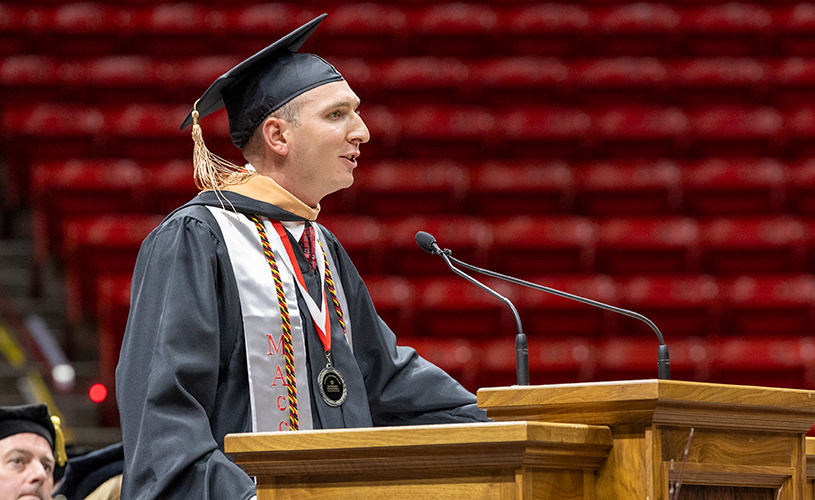at the University of Utah
Eccles School graduates are encouraged to ‘be a part of transformational change’
The David Eccles School of Business convocation ceremony on Friday, May 3 served as both a celebration of the day and an appeal for new graduates to pay it forward.
Before some 1,600-plus grads were awarded more than 1,700 degrees on Friday evening at the Jon M. Huntsman Center, a trio of speakers made the point that graduation was not a hard dividing line between days gone by and those ahead, but rather a through point for the former to complement the latter.
Mike E. Hale, Chair of the David Eccles Alumni Network Board, reflected upon his time as a U. student, and how several professors and a mentor demonstrating their belief in his ability subsequently prompted him to begin serving as an alumni volunteer a decade ago.
He wanted to help others the way he had been, and he challenged 2024 graduates to do the same.
“As you embark on your next chapter, do so with the intent not only to improve your own careers, but to also be the catalyst for others’ success,” said Hale. “Give back. Be the alum who transforms a student’s view of themselves for the better.”
Student speaker Michael Zoumadakis detailed his family’s long history with the Eccles School, noting that his grandmother earned her marketing degree in 1960 (as one of only two women in her class), and that his mom, two uncles, a brother, and three first cousins are all Eccles School grads as well. Zoumadakis himself earned a Business Administration degree in 2018.
“This school isn’t just an educational institution to us; it is our legacy,” he said, later giving his grandmother another shout-out, as he pointed her out to the audience, drawing a racous ovation.
He boasted of leaving the Eccles School as an undergrad “feeling invincible” — only to be humbled by several layoffs and a volatile job market in a post-pandemic world. A random visit to campus yielded a chance meeting with a former professor, who encouraged him to continue his education by becoming a Master of Accounting student. One of 700-plus students to earn a graduate or doctoral degree from the Eccles School on Friday, Zoumadakis will be working for one of the “Big Four” accounting firms post-graduation.
He made the point that a return to his past helped give him a stronger future.
“Whether it’s serving on a board, joining a club, building your network, or hitting the books day in and day out, our Eccles experience prepared us for the real world,” said Zoumadakis. “Throughout our time here, professors and staff have helped us identify our strengths, combat our weaknesses, and formulate a plan to move us into the working world.”
The final speaker of the evening, Rachel Hayes, Dean of the Eccles School, lauded outgoing students for helping to “enact changes and enhancements” that will make the experience better for those who follow.
That feedback, she explained, directly impacted efforts to create a culture of belonging for all students, to upgrade the undergraduate curriculum and student experience, to align academic advisors more closely with Business Career Success coaches, and to build the “In A Pinch Basic Needs Initiative” that connects students with supportive resources for food, housing, and mental healthcare.
“None of this would have been possible without you and your willingness to voice your opinions, your courage to share your experiences, and your commitment to being a part of positive change and progress for yourself, your peers, and all the Eccles students who will come after you,” said Hayes.
Those changes should help make the Eccles experience an even more comprehensive one, with various focuses on the classroom, extracurricular activities, and experiential learning through centers and institutes having the collective ability to make students “better prepared to be empathetic and inclusive leaders no matter where you go next,” she added.
As for what comes next, Hayes encouraged graduates to maintain the values they learned at the Eccles School.
“As you end your time here, I challenge you to think about how you can continue to be a part of transformational change in your career and communities going forward. We need your creativity, your empathy, and your innovation to solve the problems and maximize the opportunities that lie ahead.”





